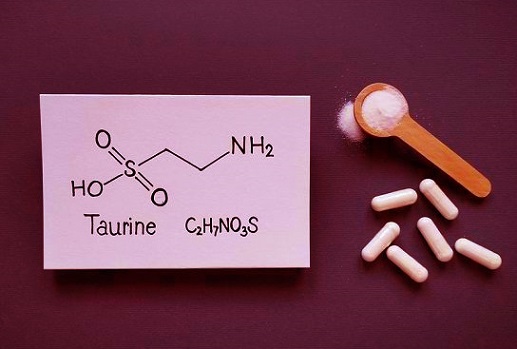Nikhil Prasad Fact checked by:Thailand Medical News Team Jan 14, 2025 3 months, 2 days, 5 hours, 53 minutes ago
Medical News: A groundbreaking review by researchers Stephanie Seneff from the Massachusetts Institute of Technology (MIT) and Anthony M. Kyriakopoulos from the University of Patras, Greece, has revealed the critical role of taurine, a conditionally essential amino acid, in maintaining mitochondrial health and protecting cells from various forms of oxidative stress and deuterium toxicity. This discovery not only sheds light on taurine's cellular benefits but also its potential in managing chronic diseases.
 Taurine Protects Mitochondria and Supports Cellular Health
What Is Taurine?
Taurine Protects Mitochondria and Supports Cellular Health
What Is Taurine?
Taurine, often found in animal-based foods such as meat, eggs, and seafood, is the most abundant free amino acid in the human body. Unlike other amino acids, taurine contains a sulfonic acid group rather than a carboxyl group, giving it unique properties. It is synthesized in the body from methionine and cysteine but is considered conditionally essential due to its limited production during high metabolic demand. Taurine’s roles range from regulating cell volume to acting as an osmolyte, primarily in metabolically active tissues such as the heart, brain, liver, and skeletal muscles. This
Medical News report explores the profound ways taurine influences cellular health.
Taurine and Mitochondrial Function
Mitochondria, the powerhouse of the cell, generate energy through ATP synthesis. However, they are vulnerable to oxidative stress, which can disrupt ATP production and lead to cell death. Taurine’s role in mitigating oxidative damage is crucial. It interacts with hypochlorite, a reactive molecule released during inflammation, to form N-chlorotaurine (NCT), a compound with anti-inflammatory properties. Additionally, taurine’s buffering capacity helps maintain the slightly alkaline pH required for optimal mitochondrial enzyme function.
Taurine also supports mitochondrial health by stabilizing the inner mitochondrial membrane, thus preventing the release of cytochrome C, which triggers apoptosis. In cardiomyocytes, taurine deficiency has been linked to impaired mitochondrial respiratory function and increased oxidative stress.
Taurine’s Novel Role in Deuterium Toxicity
Deuterium, also known as heavy hydrogen, is an isotope that can accumulate in mitochondria and disrupt their function. Excess deuterium interferes with the F0F1 ATPase motor - a critical enzyme for ATP production - causing inefficiencies and increased production of reactive oxygen species (ROS). Taurine has been shown to mitigate these effects by promoting metabolic processes that produce deuterium-depleted nutrients and water.
The study highlights how taurine supports gut microbes in synthesizing deuterium-depleted short-chain fatty acids, such as butyrate, and nutrients that reduce deuterium’s impact on mitochondrial health. Taurine also enhances the production of sulfomucins in the gut lining, which trap and sequester deuterium, further protecting cellular integrity.
Taurine a
nd Chronic Diseases
Taurine’s protective effects extend to several chronic diseases. Research links taurine deficiency to conditions such as cardiovascular disease, metabolic syndrome, and neurological disorders. Taurine’s antioxidant properties and ability to normalize ATP production make it a promising therapeutic agent.
In cancer, taurine shows a dual role. While it supports mitochondrial health in normal cells, taurine derivatives like NCT can induce apoptosis in cancer cells by disrupting mitochondrial function. Studies also reveal taurine’s role in enhancing the efficacy of cancer treatments by reducing oxidative stress and improving immune response.
Gut Microbiome Collaboration
The collaboration between taurine and gut microbes is pivotal for maintaining intestinal health. Gut bacteria metabolize taurine-conjugated bile acids, releasing sulfate that supports the synthesis of sulfomucins. These sulfomucins form a protective barrier in the gut, shielding against pathogens and reducing inflammation.
Moreover, taurine’s role in the gut extends to its interaction with hydrogen-producing bacteria, which contribute to the production of deuterium-depleted water. The presence of healthy gut microbes like Akkermansia muciniphila and Faecalibacterium prausnitzii, known for their roles in producing beneficial short-chain fatty acids, further enhances taurine’s positive effects.
Key Study Findings
The researchers outlined several key findings:
-Mitochondrial Protection: Taurine stabilizes mitochondrial function, preventing oxidative damage and apoptosis.
-Deuterium Detoxification: Taurine helps manage deuterium toxicity by promoting the synthesis of deuterium-depleted nutrients and water.
- Health: Taurine supports gut microbial metabolism, enhancing the production of protective sulfomucins and short-chain fatty acids.
-Cancer Therapy: Taurine derivatives like NCT induce cancer cell apoptosis while sparing normal cells, highlighting its potential in cancer treatments.
-Antioxidant Role: Taurine enhances the activity of antioxidant enzymes like glutathione peroxidase, reducing ROS and protecting cells from oxidative stress.
Conclusion
Taurine emerges as a vital amino acid with multifaceted roles in cellular health. From protecting mitochondria against oxidative and deuterium-induced stress to supporting gut health and improving chronic disease outcomes, taurine’s impact is profound. Its ability to collaborate with gut microbes and influence mitochondrial function underscores its therapeutic potential.
The study findings were published in the peer-reviewed journal: Amino Acids.
https://link.springer.com/article/10.1007/s00726-024-03440-3
For the latest on the health benefits of Taurine, keep on logging to Thailand
Medical News.
Read Also:
https://www.thailandmedical.news/news/therapeutic-benefits-of-taurine-and-histidine-in-retinal-health
https://www.thailandmedical.news/news/brazilian-randomized-clinical-trial-finds-that-taurine-supplements-can-aid-in-anti-aging-treatments
https://www.thailandmedical.news/news/study-reveals-lower-taurine-levels-in-individuals-with-inflammatory-bowel-disease
https://www.thailandmedical.news/news/taurine-supplements-the-potential-game-changer-for-metabolic-syndrome
https://www.thailandmedical.news/news/gene-that-causes-cardiomyopathy-and-blindness-discovered-along-with-treatment-using-taurine-supplements
https://www.thailandmedical.news/news/n-chlorotaurine-shows-promise-against-gum-disease
